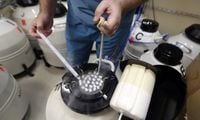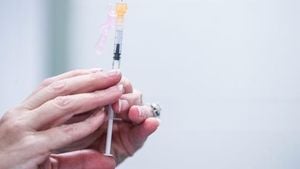A public broadcasting investigation by NOS has revealed alarming truths about fertility clinics in the Netherlands, which have been violating strict sperm donation regulations for decades. According to the Dutch Society of Obstetrics and Gynecology (NVOG), at least 85 men have become "serial donors," each fathering 25 or more children. Disturbingly, some individuals have fathered as many as 50 to 75 children.
Marieke Schoonenberg, the head of NVOG, publicly apologized, stating, "The number of serial donors at clinics should have been zero. We have done wrong." This admission highlights the systemic failures within the fertility clinics, where sperm from the same donor was intentionally used multiple times, exchanged without necessary paperwork or consent, and allowed some donors to contribute at multiple clinics.
Ties van der Meer, from Stichting Donorkind, an organization that assists children in finding their biological sperm donors, noted that new data indicates at least 3,000 people in the Netherlands have 25 or more half-siblings. In a country as small and densely populated as the Netherlands, this raises the risk of accidental incest. Van der Meer warned, "Once they start dating someone, they will need to do DNA tests to ensure they are not dating a relative."
One of the most notorious cases is that of Jonathan Jacob Meijer, a 43-year-old Dutch YouTuber, who has fathered at least 550 children. Meijer is the subject of the Netflix documentary "The Man with 1,000 Kids" and has faced legal action due to concerns about incest and inbreeding among his offspring. In 2017, he was discovered to have at least 102 children, and a court ruling in 2023 mandated that he cease donating sperm or face fines of 100,000 euros (approximately 88,000 British pounds) for each violation. Clinics were also ordered to destroy any sperm samples they had collected from him.
Despite these restrictions, Meijer has continued to donate sperm abroad, including to a Danish sperm bank that operates worldwide. He criticized the Netflix documentary as "misleading," asserting that most families he has helped were aware of his donations and were satisfied with his contributions. He told the Independent, "I never intended to have 100 kids or 500 kids. It happened step by step. Many donors want to be in the news, but for me, if no one knows about me, that’s perfectly fine. Now they know about me, so I want to explain my story from my side."
This situation has sparked outrage and concern among the public and experts alike. Ties van der Meer emphasized that the findings not only damage public trust in the healthcare system and government but also create anxiety for the children and some donors involved. He stated, "This is a medical disaster for the Netherlands."
The National Obstetrics Organization of the Netherlands (NOGV) reported on April 15, 2025, that many infertility clinics have been using each sperm sample more than 25 times without proper documentation or consent from the donors. In 1992, the Netherlands limited each donor to a maximum of 25 children to prevent incest and consanguineous relationships, but enforcing this rule has been challenging due to strict confidentiality laws surrounding donor information.
In 2018, the limit was further reduced to 12 children, but a new registration system for donors and mothers to ensure compliance with these limits only started operating this month. Since 2004, anonymity for donors has been abolished, allowing for better tracking of the number of children born from each donor.
Dr. Marieke Schoonenberg, a member of NVOG, noted that the majority of the 85 identified "serial donors" fathered between 26 and 40 children, while some have fathered as many as 50 to 75 children. Among these 85 individuals, at least 10 obstetricians have illegally donated sperm, with Jan Karbaat being the most infamous, having fathered at least 81 children.
With a population of over 17.8 million people living in an area of approximately 41,865 square kilometers, the Netherlands faces unique challenges regarding the implications of these findings. The NVOG is urging mothers, donors, and children conceived through these clinics to contact sperm banks and fertility clinics to address these issues.
The Dutch Ministry of Health has announced that it will soon present a report to parliament on this critical situation, which underscores the urgent need for reform in the fertility treatment sector. As the investigation continues, the implications of these revelations will likely resonate throughout the country, prompting discussions about ethics, regulations, and the future of sperm donation practices in the Netherlands.





